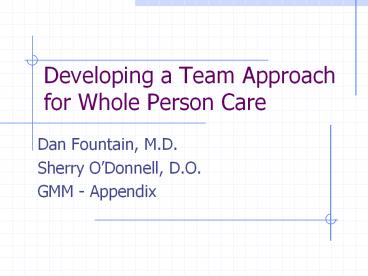Developing a Team Approach for Whole Person Care PowerPoint PPT Presentation
Title: Developing a Team Approach for Whole Person Care
1
Developing a Team Approach for Whole Person Care
- Dan Fountain, M.D.
- Sherry ODonnell, D.O.
- GMM - Appendix
2
Importance
- Care for mind, soul, and spirit takes time and
training - No one can adequately do it all
- All dimensions of care should be readily
available - Ideally under one roof and without financial
barriers
3
The caregiving team
- Health professionals
- Pastoral caregivers in some cases
- Volunteer spiritual caregivers
- Whole staff and administration
- Pastoral support in the community
- Intercessory groups
4
Why train lay people?
- Many are available and want to help
- They are volunteers
- They can be excellent listeners and supporters
- They have time
- Most people with heart burdens do not need
professional help - They need a listening ear
5
What do we call them?
- Spiritual caregivers
- Lay ministers
- Patient advocates
- You may prefer another term
6
Qualifications
- Personal relationship with Jesus
- Good knowledge of the bible
- A call from God to help hurting people
- Spiritual maturity
- Right attitudes compassion, sincerity,
humility, willingness to sacrifice - Ability to maintain confidentiality
7
Recruitment
- From area churches
- Initial approach is to pastors and church
leaders. Their support is critical - Personal application form
- Pastoral recommendation form
- Personal contact or interview can help
8
Training involved
- Health professionals must be trained
- Up to four hours in wholeness, the centrality of
Jesus in healing, how to discern heart
problems, how to refer to SCGs, how to pray with
sick persons, team dynamics - Attendance at a METS conference or the Saline
Solution can help - Doctors not trained in this approach hinder the
process
9
Training of spiritual caregivers
- 28 to 24 hours of interactive and participatory
training - God, Medicine, and Miracles for background
reading - Helping Hurting People as training manual
10
Staff orientation
- The whole staff should be aware of this approach
- They need to demonstrate compassion, empathy,
gentleness, a desire to help - A few may give care themselves
- Some of them may need care
11
Who to refer for spiritual care?
- Psychosomatic complaints
- Cardio-vascular disease
- Diabetes
- Chronic pain syndromes
- Chronic digestive, resp, infectious diseases
- Auto-immune diseases
- Malignancies liver disease
- Any with heavy stress or inner burdens
12
Making the bridge
- Health staff are first to see sick people
- They can then refer people to SCGs
- A personal introduction by the physician to the
caregivers is of great benefit and is worth the
short time it takes
13
A counseling room
- A special private place is important
- Should be near the clinical area
- Caregivers, when unoccupied, can be in the
waiting area or with staff
14
Regular contacts
- Between health and spiritual caregivers
- To discuss results, problems, and particular
situations - To pray together
- Spiritual caregivers are under the supervision of
the professional staff
15
Coordination
- Any volunteer group needs a coordinator
- To make schedules, changes, and assure
communication - To give regular encouragement
- This can be a staff person
- It can be one of the volunteers
- Coordinator should be available for prayer
- Prayer is essential for success and fruit
16
Keeping records
- SCGs may keep a short note of each contact for
future personal reference. - The only official record should be seen by a
SCG on date - Good to keep a register of all who receive
spiritual care
17
Confidentiality
- SCGs needs to be well informed of this
- Any breach should be handled immediately
- A confidentiality form should be signed
18
Other aspects
- Bibles to give away
- Other helpful literature
- A list of other available social support services
in the community - A list of churches that can be suggested
19
Observational research
- An ideal situation for seeing the effects of
spiritual care on various conditions - We need to document the effectiveness of
spiritual care - A carefully designed protocol is necessary
- Can provide evidence for the importance of
spiritual care
20
Importance of intercession
- Regular prayer with staff
- Regular prayer with spiritual caregivers
- Prayer support in churches of staff and
caregivers - Perhaps a special intercessory group
- This is spiritual warfare
21
Legal aspects
- Consult with legal advisors
- Possibility of establishing a separate legal
entity without assets - Have a clear mission statement available for all
to see This is a Christian clinic..
22
Culture war
- Spirituality is for church, not the clinic
- You cant bring Jesus into the clinic
- It is unethical to share your faith with a sick
person - You can only help them with their spirituality
23
How should we respond?
- This approach is evidence-based
- External religion and internal faith have
positive effects on health and healing - The approach is patient-directed
- We offer spiritual care and pursue it only with
those who are interested
24
Discussion
- How do you see this fitting into your situation?
- Discuss with others and share ideas
- What steps do you foresee taking in strategic
planning for this?

